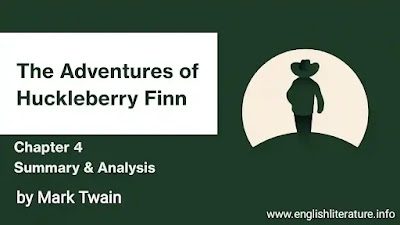Also Read
SUMMARY
Huck has moulded himself, reasonably well, to the new environment; both at home as well as in school. He has learnt to read, write and say a few multiplication tables. He has also got accustomed to living in a house and sleeping on a bed. Considering his background and upbringing, these are great feats.
One day, during breakfast, Huck accidentally turns over the salt cellar an indication of ill-luck. As he tries to throw the salt over his left shoulder, he catches Miss Watson's attention who admonishes him for his sloppiness, while the younger sister is more tolerant.
As Huck goes out, into the snow-covered garden, he notices footprints. He recognizes a cross on the left foot heel and, discerning it to be those of his father. Aware that Pap is probably after his money (that $ 6000 that he got from sharing the treasure with Tom) he rushes to Judge Thatcher and urges the latter to keep his money for a 'consideration' of one dollar. Then still quite worried over what is going to happen, he rushes to meet Jim and urges him to talk to his hair-ball and foretell his father's plans. Jim tries to talk to the hair-ball but says that it wouldn't work without money. Huck offers him a counterfeit quarter that Jim places under the hair-ball, By way of prophecy, he gives some ambiguous answers to Huck. He is warned against the impending conflict between the good white angel and the bad black one and that he can look forward to some good as well as bad times. Huck returns to his home and finds Pap waiting for him.
CRITICAL ANALYSIS
Superstition permeates this chapter, as it does most of the novel. The incident of the salt-cellar signals ill-luck for Huck. And, sure enough, he has to face Pap' when he returns home. In the night of the relationship between father and son, it is unfortunate enough. The fact that Huck instinctively chooses to consult Jim's hair-ball, to get an answer to all his questions, makes it evident enough that he believes in Superstition. The hairball's warning, that Huck should avoid water, goes unheeded when, later in the novel, he and Jim run downriver.
Typically Huck is very logical and reasonable. But when confronted by superstition, Huck behaves contrary to his usual manner perhaps a reminder that he is just a child or an allusion to typical sensibilities of that time, Huck is most superstitious whenever he is extremely worried about his future. Superstition also serves of foreshadow events throughout the novel, as Huck knows that bad luck will return to haunt him.
Tom Sawyer's gang can be viewed as a childish representation of society as a whole, an example of a synecdoche. Twain mocks the adult world in this chapter by showing that although the adult world relies on books such as the bible to define civilization, private and robber books might also suffice.
Jim's obsession with money, as shown via the hair-ball incident, gently paves the way for one of the themes of the novel. In a bid to be a realist, Mark Twain uses the money motif to establish the truth about its corrupting influence. The hair-ball incident prepares us for similar incidents, directing our attention to the theme of money, that we can expect to encounter, later in the novel. Though Jim is not a hardcore corrupted soul, his inclination towards money is definitely more than that of Huck, who entrusts his entire wealth to Judge Thatcher whereas Jim doesn't mind taking even a counterfeit quarter to make his hair-ball foretell Huck's future.
